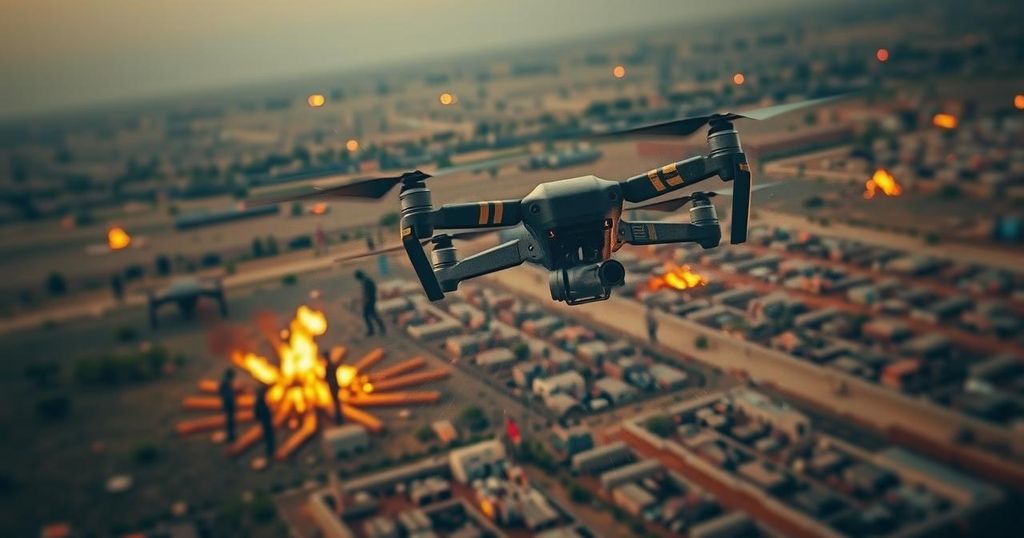Iran and UAE Drone Support Heightens Sudan Conflict Dynamics

Iranian cargo planes and UAE-supplied drones are intensifying the conflict in Sudan between the SAF and RSF, leading to significant civilian casualties and humanitarian crises. The influx of UAVs violates UN arms embargoes and prolongs warfare, despite international calls for peace negotiations.
Since January, Iranian cargo planes have consistently been sighted at Port Sudan airport, which serves as the base for Sudan’s ruling junta led by General Abdel Fattah al-Burhan of the Sudanese Armed Forces (SAF). These aircraft’s arrival coincided with intensified SAF assaults against the rival Rapid Support Forces (RSF), employing Iranian-made Mohajer-6 unmanned aerial vehicles (UAVs). Concurrently, the RSF has been supplied with weapons and resources from the United Arab Emirates (UAE) and Russia, which include drones capable of delivering 120 mm mortar shells. This growing reliance on drones highlights the increasing significance of aerial warfare in the protracted conflict between SAF and RSF, fueled by external support from nations looking to secure strategic advantages over Sudan’s resources.
Despite some drones being locally produced, the influx of foreign UAVs violates the United Nations’ arms embargo against Sudan. Much of the weaponry and resources from Russia and the UAE have traversed through neighboring Chad and Libya. A recent UN report unveiled that the UAE had masked its support for the RSF as humanitarian assistance for displaced persons in Chad. The Africa Corps, previously known as the Wagner Group, has facilitated the smuggling of arms, including surface-to-air missiles, into Sudan, while Russia provides official backing to the SAF, aiming to establish a presence along the Red Sea coast.
The UAE’s provision of quadcopter drones has been observed not only in Sudan but also in conflict zones like Ethiopia and Yemen. The RSF has utilized these drones for aggressive maneuvers, including strikes on SAF targets and attacks on civilian facilities, leading to significant casualties. The SAF also employed UAVs to target civilian areas, worsening the humanitarian crisis. The introduction of Iranian drones has notably enabled the SAF to reclaim strategic sites, including the state broadcaster, amid ongoing violence.
Since the outbreak of conflict in April 2023, reports indicate that over 15,000 individuals have lost their lives, with millions displaced due to violence. Experts opine that actual casualties may be significantly higher, as many areas remain inaccessible for assessment. The prolonged conflict has severely impacted healthcare, particularly in regions such as North Darfur, where children and pregnant women succumb to manageable diseases due to a decimated medical network resulting from ongoing attacks.
The continued influx of drones is believed to exacerbate the conflict, undermining the possibility of resolution despite international diplomatic efforts. As evidenced by the SAF’s refusal to engage in peace negotiations in Jeddah, Saudi Arabia, the ongoing support from external powers has substantial implications for the regional stability. According to Hamid Khalafallah, a Sudan expert, “If the UAE withdraws its support and cuts ties with the RSF today, there’s an 80 per cent chance the war might end tomorrow.”
The situation in Sudan represents a multifaceted conflict characterized by the intense rivalry between the Sudanese Armed Forces and the Rapid Support Forces, both vying for dominance over the nation’s valuable resources. The active involvement of external actors, such as Iran, the UAE, and Russia, has significantly shaped the dynamics of this war. Their militaristic support has introduced advanced warfare capabilities including unmanned aerial vehicles which have become central to tactical operations. This violent struggle has resulted in a dire humanitarian crisis, leading to widespread suffering among the civilian population.
The ongoing conflict in Sudan, exacerbated by the influx of drones from external powers, presents a complex humanitarian and political crisis. The involvement of nations like Iran and the UAE has not only sustained the hostilities between the SAF and RSF but has also caused tragic repercussions for civilians. As the situation evolves, experts remain concerned that unless significant changes in foreign support occur, peace remains a distant prospect for Sudan.
Original Source: www.defenceweb.co.za








